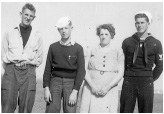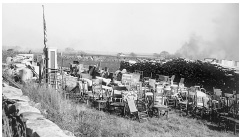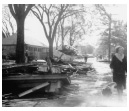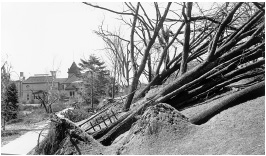Sudden Sea (29 page)

Entire beach communities were lost. This broken shell of Pleasant View House, a large oceanfront hotel, was just about all that was left of Misquamicut, R.I.
National Archives

Teetering on a mound of sand, this Rhode Island beach house was salvaged and still stands today.
Hurricane Collection of George H. Utter, Westerly, R.I.

Clayton Chellis (
second from left
) in 1945 on his last home leave with his parents, Carl (
left
) and Ethel, and his brother, Bill

Lillian and Jack Kinney, fifty years later. After surviving the hurricane in the old Napatree fort, they believed that, together, they could survive anything.
Hurricane Collection of George H. Utter, Westerly, R.I.

The morning after, the southern New England shoreline looked like a huge yard sale.
Hurricane Collection of George H. Utter, Westerly, R.I.

Boats were everywhere except at their moorings. They were beached on main streets and in backyards.
© 1938 Southern New England Telephone Company. All rights reserved.

So many trees fell, there was enough timber to build 200,000 five-room houses. Sawing and salvaging it would take five years.
Hurricane Collection of George H. Utter, Westerly, R.I.
A Nickel for Your Story
A
fter the storm had blown through, everyone in New England had a hurricane story and would repeat it so readily that an enterprising Boston man donned a sandwich board:
FOR A NICKEL, I’LL LISTEN TO YOUR HURRICANE STORY.
Here are a few of the strangest, saddest, or most amazing.
˜ In the Westerly area, two babies, each one year old, rode out the storm safely on mattresses. One baby did not have a scratch or a sniffle. The other imbibed a quantity of seawater and spent several days in the Westerly Hospital on the critical list before making a full recovery.
˜ A number of babies were born during the hurricane. Sergeant John Lipstack was stranded at his post in Fort Adams, Newport, while his wife was giving birth to a son at their apartment in Jamestown. On Long Island, Mrs. Joseph Gatz was doing well in what remained of Eastern Long Island Hospital. Her daughter, Shirley Ann, was born at 3:20
P.M
., just as the hospital roof blew off and rain began pouring into the delivery room.
˜ As if seeking payback for the generations of sailors guided safely home, the hurricane tore down lighthouses and cast the keepers and their families into the sea. In Narragansett Bay, the Castle Hill and Sandy Point lighthouses were badly damaged. The Sandy Point station house was swept away with keeper George T. Gustavas, his wife, his son, and three friends inside. A second wave tossed Gustavas back to shore, where he kept the light beaming throughout the storm. The Whale Rock Light, a solid cast-iron tower about a mile west of Beavertail Point, crashed down from its rocky base, taking the lightkeeper with it. At Bullock’s Point Light in the Providence River channel, keeper Andrew Zaius climbed into the tower and kept the beacon lit even after the gale ripped off a wall and washed away the stairs.
˜ Lightkeeper Arthur Small and his wife, Mabel, were alone on Palmer’s Island near New Bedford, Massachusetts, that Wednesday. A modest man who often said that living in a city with fast cars and fast talkers was considerably more dangerous than keeping the Palmer Light shining, Captain Small had been keeper since 1919. As the day turned ominous, he told Mabel to wait in the oil house, the highest point on the island, while he rowed out to the light. His dinghy capsized in the churning sea. Mabel tried to launch a boat to rescue him. She died in the attempt, but Captain Small managed to swim to the lighthouse. He dragged himself into the tower and kept the light burning through the hurricane. In the morning, only two buildings were standing on Palmer’s Island — the lighthouse and the oil house.
˜ A crippled Mastick Beach, Long Island, man watched both of his artificial legs carried out of his cottage in the storm. Three days later they were found lying side by side on a beach at East Moriches, ten miles away.
˜ At a farm in Mecox, Long Island, two cows were washed away in the storm surge. They swam home, clearing a four-foot wire fence, and showed up at the barn at the usual milking hour.
˜ The Fo’c’s’le, a favorite watering hole in Sakonnet Point, Rhode Island, was picked up, taken for a cruise, and dropped off on the other side of the point. The owner shored it up in its new location and opened for business as usual.
˜ When WPRO, a Providence radio station, lost its transmitting tower, the manager connected the engine from a farmer’s tractor to a power generator and resumed broadcasting.
˜ Two teenagers, Charles Lucas and Tommy Fay, happened to be in the Quogue Market when a woman from Dune Road was offering a fifty-dollar reward to anyone who would go down to her house on Westhampton Beach and rescue her dog. The boys took the offer and set out just as the storm surge was rolling over the beach. Their bodies were found several days later.
˜ Helen Lewis was scheduled to speak at a luncheon on Wednesday, September 21. She was the Republican nominee for secretary of state in Connecticut and the first woman ever nominated for statewide office. When the lunch was canceled at the last moment, Mrs. Lewis was thrilled. She could spend the perfect beach day with her husband and daughter at their home on Thimble Island, just off the coast of New London. Mrs. Lewis would not win the election. Her cottage was washed out to sea, and she and her husband drowned.
˜ A wealthy Connecticut woman and her maid were rescued after riding out the storm atop her grand piano.
˜ A Connecticut grandmother was found crushed beneath a large tree, clutching her grandson’s rubbers. She went out at the height of the storm to meet the boy on his way home from school.
˜ The First Lady of New York, Mrs. Fiorello La Guardia, was stranded upstairs in her Long Island home and rescued by firemen.
˜ In Harrison, New York, “America’s Sweetheart,” Mary Pickford, narrowly escaped injury when a telephone pole fell on her car.
˜ Three Misquamicut boys were trapped in a floating beach house when a neighboring cottage bumped up against theirs. An elderly woman was clinging to the roof. One boy with a rope tied around his waist attempted a rescue. He reached the woman, but her foot became wedged between the two houses. The boy was trying to free it when his friends shouted. A huge wave was about to break over the roof. They yanked the rope, pulling the boy back safely, but the woman was crushed.
˜ The Sullivans, who operated a granite quarry in Westerly, owned a very sturdy house at Misquamicut, anchored with steel bars and reinforced with solid granite. Mrs. Sullivan was alone in the house during the hurricane. As the water rose, she went upstairs, finally holing up in the windowless attic, where she began to experience motion sickness. The attic was floating. Early the next morning, her husband and son found the attic on the far side of the salt pond. Mrs. Sullivan was inside, sound asleep on the couch.
˜ Jack Tobin would fight in World War II, but his closest brush with death came in the storm. Tobin was getting out of his car when a slate shingle shot by, two inches from his neck, and buried itself in the steel of the car.
˜ About one o’clock in the morning, twenty-seven-year-old Henry Morris of Weekapaug, Rhode Island, a carpenter and senior lifeguard, was searching for survivors when he saw a candle in a window of the Weekapaug Inn. Where the tennis courts had been the day before, there was now a ten-foot-deep, seventy-five-foot-wide breachway. The inn, or what remained of it, had become an island on which five people were trapped. The air was cold and the water was running fast, but Morris swam back and forth across the breachway five times and successfully rescued everyone at the inn. He received the Carnegie Medal for Heroism for his efforts.
˜ As the epitome of an unflappable butler, Arni Benedictson proved to be the equal of Jeeves. Benedictson, the butler of Mr. and Mrs. William Ottman Jr., of Westhampton, sheltered twenty-three people during the storm, including the Countess Charles de Ferry de Fontnouvelle, wife of the French consul general, who had arrived at the Ottmans’ door in her underwear, clutching her infant child. Benedictson rigged a flag from a bedsheet and waved it from the roof to signal for help. Deducing that their survival was precarious, he informed his guests that the situation was “most disturbing” and said, “Perhaps I should venture outside and bring help from the mainland.” Benedictson struck out in the hurricane and returned with three “stout boys” in tow. With their help, he led his band to safety, shepherding them across a bridge to the mainland, just moments before the bridge collapsed.
